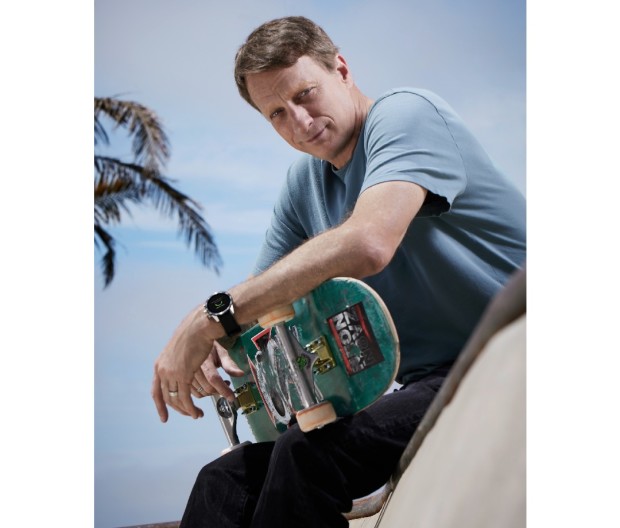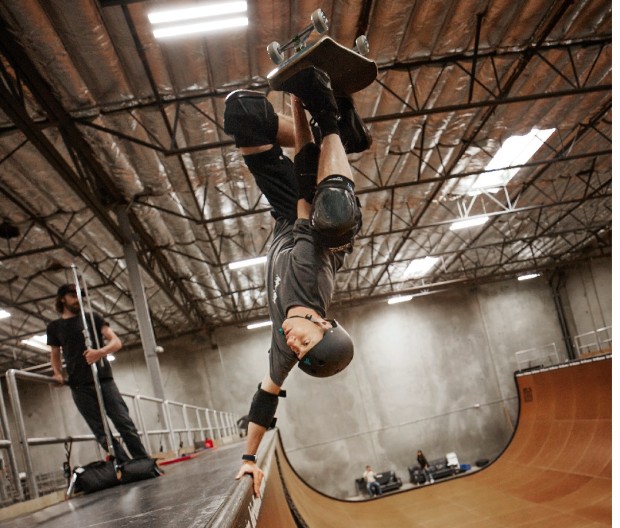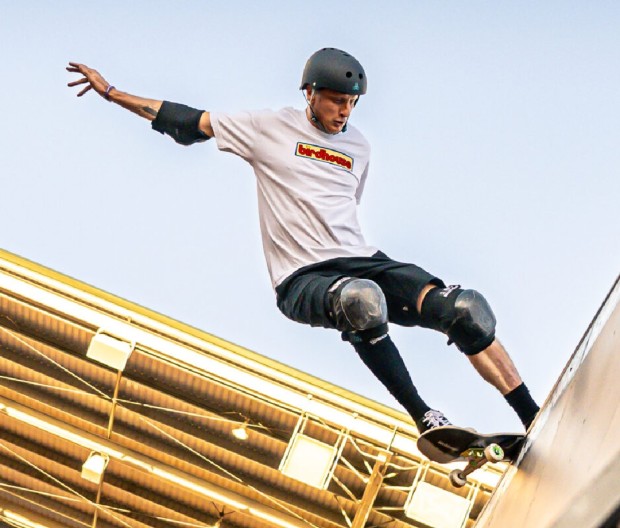Tony Hawk’s legendary status in skateboarding and extreme sports encompasses numerous feats performed over several dominant decades—capped by the first-ever 900-degree spin way back at the 1999 X Games. Now in his 50s, Hawk’s second-greatest career triumph still lies ahead. Coming out of retirement, he’ll be competing in yet another X Games this summer in Japan.
A lot has happened in the sport and beyond since Hawk’s historic 900—which remains the perfect demonstration of the boarder’s still-present tenacious spirit. So does his return to competition after suffering a serious leg injury last year. In past events, Hawk would barely warm up before hitting the ramp. This time, a more methodical approach to his preparation includes his first experience tracking health data.
We spoke with Hawk about recovering from a broken femur, getting back on the board, how his approach to risk has changed, and what it means for him to return to the X Games.

Courtesy image
Men’s Journal: How does it feel to be returning to the X Games?
Tony Hawk: I’m excited to get back to the Games, but even more excited to get back to skating at a level worthy of competition. The X Games are such a staple of our sport and have been for over 25 years. Has it been 30 years? See, I’m so old now I can’t remember if it’s 20 or 30! I’m feeling a little more hopeful each day after training, coming off this injury last year. I’m actually gonna go skate right after getting off the phone.
There’s a lot of interconnectivity between the X Games and my own rise in the sport of skateboarding in the 90s and early 2000s. Coming back to the X Games feels something like a homecoming. There’s also an element of closure that comes with it. I know I won’t be able to participate forever, but I know I still have the ability now.
Are you scheming any big tricks?
I don’t expect to make any huge waves with some crazy, unknown trick. I won’t be at what I consider 100 percent when I get to the X Games. I won’t be at where I was before I got hurt, but I’ll be as close as humanly possible—and that’ll be good enough. There are a few new things I have in mind, which I’ll test out leading up to competition. I’m going to start with a Madonna Sugarcane or a variation. That’s a trick I learned right before I got hurt. If that goes well, I have something else planned.
Speaking of the leg injury, can you explain exactly what happened?
I broke my femur in March last year doing a trick that I’d taken for granted. I had done the McTwist, which is a front flip combined with a 540-degree rotation. I didn’t get enough speed going into the trick, and I thought that I might be able to make up the difference in the air, like I had many times before. The next thing I knew, my leg was pointing in the wrong direction.

Courtesy image
How rough was the recovery?
I was too ambitious with the recovery the first time around. I was skating almost right away, before my leg was even close to healed. The bones hadn’t fused together yet and were still very much separate. Those bones ended up misaligned. So for the first seven or eight months of my recovery, I wasn’t making the right kind of progress. I think I was just in denial about the state of affairs.
I was in constant pain and my abilities weren’t progressing in a way I was happy with. I eventually got X-rays and also heard the hard truth that I wasn’t healing in the right way. I had a nonunion fracture, which means it was never going to get right that way. I had to get it reset. It’s been five months since then, and I’ve been healing a lot better.
How were you more tactful with the second go-around?
My recovery has been more like it should have that first time. I didn’t do anything at all for the first two months. I kept myself busy in other ways, which was a pleasant surprise. I always thought skateboarding was the baseline, and if I didn’t have that I wasn’t allowed to do all this other stuff. It allowed me to be a lot more present in the things that my kids are doing as well. My daughter is the only one still at home, so I enjoyed getting to spend quality time with her. I got to see her perform in theater and play lacrosse.
Did your doc give you the green light to compete or...?
I went to see the doctor last week, and he gave me the go-ahead to get back to full-impact sports. Meaning, I’m able to skateboard at full tilt and compete.
Can you take us back to 1999 when you landed the 900? What was going through your mind?
Looking back, I wish I'd taken proper time to prepare for my attempt of the 900 that first time. That particular day, I wasn’t even planning on trying the trick. I’d chased it for a long time, on and off, and even gotten hurt doing it a few times. I had tried it during another big event, without getting close to making it. The trick I was going in there to perform was a Varial 720, a variation on the 720 spin, and I had made that trick earlier in the event.
Since my trick had already been completed, I had 10 minutes to count the clock. That’s when I started to try 900s, because, if there was a next stage in my trick, that was going to be it. That’s why I ran out of time, because I only had 10 minutes to figure out how to do a trick for the first time. My mindset was pretty renegade and cavalier back then. I was going to figure the trick out or I was going to be taken away in an ambulance. Those were the only two options I saw before me.

Courtesy image
How has your mindset changed since then?
I still have the drive to compete but my approach is more level-headed these days. I have no problem leaving the ramp if the trick isn’t coming together. I don’t need to put my body through any kind of extreme torture anymore. That’s how I’m going about it leading up to the X Games. I’ve been trying to relearn a lot of my old tricks. Some days I get them and some days I don’t, and I’m okay with that.
Now I’m going into trying new tricks for the X Games—which means I need to go through those harsh learning experiences again. I look to have the pieces all clearly in place. I don’t want any Hail Marys or throwing caution to the wind. I’m making sure I have all the pieces of the puzzle and am staying much more methodical these days. I’ve made focusing on my health a daily habit, which it never was before.
Can you share how you're doing that?
I never monitored my vitals or heart rate or anything like that. Now I’m using the Citizen CZ Smart Watch for that, developed in partnership with IBM Watson and NASA, and making changes based on that info. I’m also using their YouQ app to figure out when it’s best for me to sleep, wake up, and skateboard. These days, that’s been occurring a lot in the middle of the day.
I’ve lived most of my life on a hardline. Those early days, you have to take your hits. The lessons can be painful—sometimes very painful. Those aren’t lessons I want to have to learn twice. I could’ve done without the harder hits. I’m honestly lucky I made it this far, and I’m not going to blow it. It’s been good to learn how to soften and smarten my approach. Living relentlessly just isn’t sustainable forever. That’s not a recipe for longevity.
How does one warm up or recover before or after an intense skating session?
I was notorious for never warming up. I would just drop in, and it was on. I’m glad people thought that was impressive at one point, but now I feel like it’s not a habit I should keep. I should definitely be doing a lot more warming up. Recovery is huge as well. We have a dedicated ice bath in our backyard as well as a sauna. I’ll use both methods to snap out of any kind of funk I’m in mentally. Sleep is also crucially important, and the Citizen CZ has been great with helping me plan my day better around that.
Where does your motivation come from to keep competing at such a high level?
If you ask any of my friends or family, they’ll tell you the pressure comes internally. It comes from somewhere inside. I have this ongoing battle with myself, wanting to prove that I can still do those things I love to do and those tricks I built up to. There’s no specific goal or accomplishment I’m now chasing, and just maintaining the level I want can be torturous, especially with my injury. The injury has led to both flexibility and strength issues. These things have been challenging to deal with on the comeback side, and I do have bad days. But I also have good days. So, in the end, the pain is worth it. I guess that’s the only thing that matters.
Does retirement seem fleeting or imminent?
I’ve never set ultimatums, even for myself. But of course, I see those lines somewhere in the future. I’m going to this next X Games, but I also know that I won’t always be at the X Games competing. I’ll always be there to support behind the scenes though. I have a better perspective on risk versus reward these days. The injury has definitely forced me to get better at the whole balance thing. I had to decide what I was willing to endure and what I was willing to sacrifice. These days, the reward is validation and the inner calm that I get from being on a skateboard. I understand I won’t be considered a progressive skater forever, and I’ll learn to live with that. I accept that I’m getting older. There'll be a time when I’m not able to skateboard at a professional level. At that time, I’ll still skate. It'll just be on my own. I can't see a day when I don’t get on a board in some way.
from Men's Journal https://ift.tt/ZO3hoSB
No comments:
Post a Comment